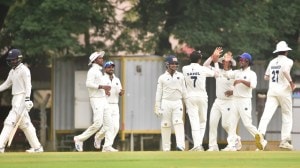In Nagaland, hockey paves way to a safer life
One of revered filmmaker Martin Scorsese’s earlier works, Goodfellas, begins its story about how the protagonist...

One of revered filmmaker Martin Scorsese’s earlier works, Goodfellas, begins its story about how the protagonist—a young boy in the initial scenes—slowly gets sucked into the world of organised crime. On celluloid the reasons given were lack of purpose and direction and of course that old excuse of having an estranged relationship with his father.
Reel life, however, is never too far from the real one. Here it may not be the same situation as it was in 60’s New Jersey, but that doesn’t mean that kids here aren’t as much susceptible to such situations as the next one.
On Thursday, a group of girls from Nagaland, aged 14 to 16, went berserk on the field at Shivaji Stadium after they won their first ever match in a major hockey tournament. They lost the very next day.
It may be presumptuous to say that they may lead or even play for India in future, when the fact is that many may leave hockey right after school. However, what makes their case so special is that hockey is not just another sport for these girls or a pass-time to score extra credit. The sport may just be the reason that they’re unscathed by the situation back home and could very well explain why they were not recruited by the so called ‘underground movement’ in Nagaland.
“We have had ceasefire back home for a while now and us civilians mostly remain unharmed by the underground activity. But that doesn’t mean that the young and impressionable can’t be coerced into joining these people. An idle mind, after all, can cause frustration that makes these kids easy targets for recruitment,” said Tosovi Anthony, coach of the St Joseph’s School team participating in the junior Nehru hockey tournament in the Capital.
“Forget the infrastructure and the equipment needed to play, to get these girls’ parents to agree is the hardest part. It’s very difficult to make them understand the importance of sports. Hockey not only teaches them discipline, in a way it protects them from various things,” he added.
For the girls, hockey is priority number one.
“We know of the underground movement but it doesn’t harm us. The problems we face are that we have to play on a ground that is bumpy and rocky, and with sticks that are of poor quality. We also have limited number of balls and safety equipment,” said Kikotsanu Weo, one of the players.
She points to her shin guard and her stick. Both are new and were ordered from Delhi just before the tournament. There are no stores in Nagaland that sell hockey equipment.
“I don’t know if I can continue with the sport for a long time but right now I am having loads of fun.” said Invalli.



- 01
- 02
- 03
- 04
- 05




























